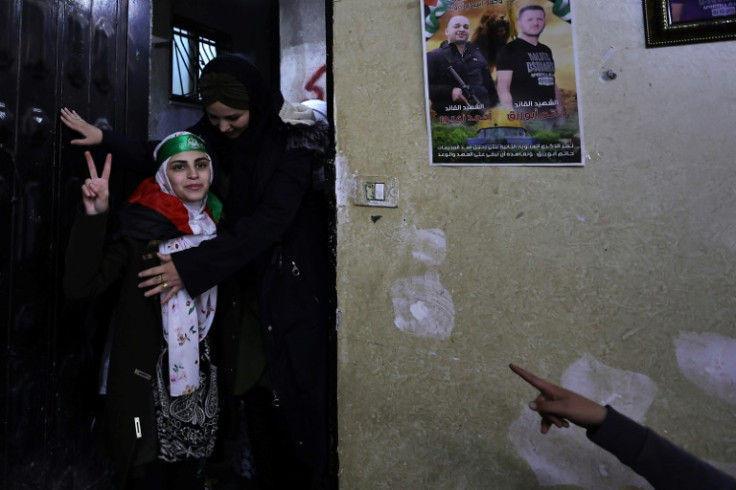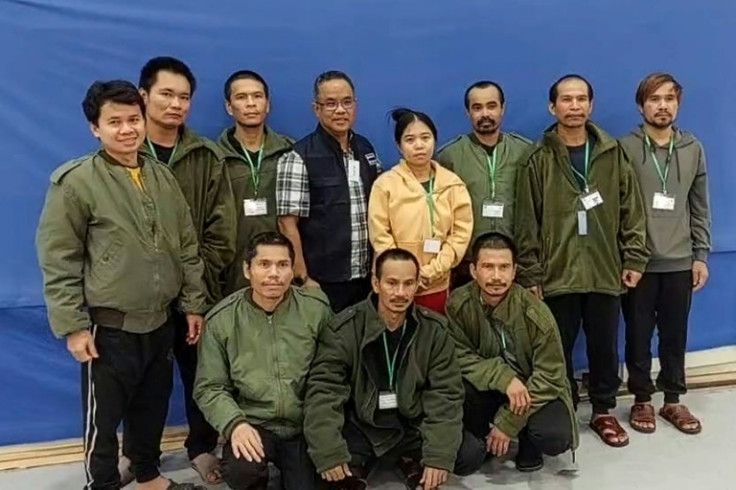
Asil al-Titi, 23, from the Israeli-occupied West Bank Balata refugee camp, arrives at the family home shortly after her release from an Israeli jail under the exchange agreement AFP
Hamas fighters were set to release a second group of hostages Saturday in exchange for Palestinian prisoners, officials said, as a truce largely held in the devastated Gaza Strip after seven weeks of war that killed thousands of people.
Israeli prison authorities said 42 Palestinian inmates -- both male and female -- would be freed under the terms of the agreement, which mandates exchanges at a ratio of three to one.
An Israeli official source said 14 hostages would be handed over.
The transfers follow an initial exchange Friday, the first day of a four-day truce that largely silenced the guns on both sides.
The second day of the truce appeared to be holding. Only a small plume of grey smoke rose over northern Gaza, the focus of Israel's air and ground offensive against Hamas, an AFPTV livecam showed.
On Friday Hamas released 24 hostages, according to Qatar and an official Israeli list. They included 13 Israelis -- all of whom were women and children, including some dual citizens.
Ten Thais and one Filipino were also unexpectedly freed.

"I couldn't believe my eyes," said Kittiya Thuengsaeng in Thailand, who thought her 28-year-old boyfriend had been killed by Hamas. Then she saw a photograph of Wichai Kalapt after his release.
"I had a chat with him in the morning. He was still smiling. He told me he was safe," she said.
Hamas fighters snatched around 240 captives when they broke through Gaza's militarised border with Israel on October 7, killing about 1,200 Israelis and foreigners, according to Israeli authorities.
In response to the deadliest attack in its history, Israel launched an air, artillery and naval bombardment alongside a ground offensive to destroy Hamas, killing nearly 15,000 people, according to the Hamas government in Gaza.
A two-minute video released by Hamas showed masked militants with rifles, wearing military fatigues and the green headband of the Islamist movement's armed wing, handing hostages over to the Red Cross.
Israel in turn freed 39 Palestinian women and children from its prisons.
In a Tel Aviv suburb, people applauded and held up Israeli flags as helicopters flew in the freed captives. Elsewhere in the city, the smiling faces of freed hostages were projected onto the walls of an art museum with the message: "I'm home".
"Today we are excited about the returnees, but I want us not to forget all those who have not yet returned," Yael Adar, daughter-in-law of former hostage Yaffa Adar, 85, told Israel's Ynet news website.
About 215 hostages remain in Gaza, though in many cases it is unknown if they are dead or alive, Israeli army spokesman Doron Spielman said.
Hamas is expected to free a total of 50 hostages during the truce in exchange for 150 Palestinian prisoners, under an agreement struck after talks involving Israel, Palestinian militant groups, Qatar, Egypt and the United States.
"It's only a start, but so far it's gone well," US President Joe Biden told reporters, adding "the chances are real" for extending the truce.
At Wolfson Medical Center, which received five elderly women hostages, Dr Shoshi Goldner said "there was no one in the room that could hold his feelings and stop crying".
"You are finally home in a safe place," Goldner said.
Israel's Kibbutz Nir Oz community issued a statement welcoming the release of the Filipino hostage Gelienor (Jimmy) Pacheco, 33, who was caregiver to Amitai Ben Zvi, murdered in the October 7 attacks.
In the Israeli-occupied West Bank, fireworks exploded and crowds filled the street where they hoisted aloft young men who had been freed from prison. Wearing identical grey jumpers, they waved Palestinian and Hamas flags.
Most of the 39 prisoners freed by Israel on Friday were released in the West Bank, an AFP correspondent reported, while 11 were taken to annexed east Jerusalem, according to the Palestinian Prisoners' Club advocacy group.
"I spent the end of my childhood and my adolescence in prison, far from my parents and their hugs," freed prisoner Marah Bakir, 24, told AFP after returning to her home in annexed east Jerusalem.
Bakir spent eight years in prison for attempting to kill an Israeli border guard.
Earlier in the evening, Israeli authorities fired tear gas to disperse crowds as the prisoners were released. The Palestinian Red Crescent said three people were shot and wounded by Israeli security forces.
In Israel, authorities asked the media to let the newly-freed hostages reunite with loved ones in privacy.
Israeli Prime Minister Benjamin Netanyahu vowed to bring all the Hamas hostages home.
"This is one of the goals of the war," he said.
The pause in fighting in Gaza opened the way to more desperately needed aid.
Trucks carrying supplies, including fuel, food and medicine, began moving into Gaza through the Rafah crossing from Egypt shortly after the truce began.
Israel had placed Gaza under near-total siege, leaving Gazans struggling to survive with shortages of water and other essentials.
In Rafah on Saturday many waited to fill gas canisters for cooking. "All the people are hoping and ready for it to make their lives easier," said one resident, Ezzeddine Abu Omeira.
Prior to the war, 500 trucks crossed into Gaza daily, according to OCHA, the United Nations humanitarian agency.
The UN estimates that 1.7 million of Gaza's 2.4 million people have been displaced by the fighting.
Thousands have now been returning to what is left of their homes.
Israel's army said early Saturday that it downed a surface-to-air missile launched from Lebanon towards an Israeli drone. In response, the army said Israeli war planes also struck infrastructure of Hezbollah, the Lebanese militant group allied with Hamas, both of which are backed by Iran.
An Israeli-owned ship suffered minor damage in a suspected attack by an Iranian drone in the Indian Ocean on Friday, a US defence official confirmed on Saturday.



